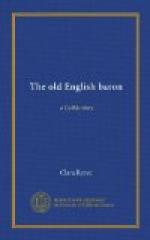They rose to attend him; he committed the Lady Emma to the care of her youngest brother, observing that the scene was too solemn for a lady to be present at it. They proceeded to the apartment; he showed the Baron the fatal closet, and the place where the bones were found, also the trunk that contained them; he recapitulated all that passed before their arrival; he shewed them the coffin where the bones of the unfortunate pair were deposited: he then desired the Baron to give orders for their interment.
“No,” replied he, “it belongs to you to order, and every one here is ready to perform it.”
Edmund then desired father Oswald to give notice to the friars of the monastery of St. Austin, that with their permission the funeral should be solemnized there, and the bones interred in the church. He also gave orders that the closet should be floored, the apartment repaired and put in order. He then returned to the other side of the Castle.
Preparations being made for the funeral, it was performed a few days after. Edmund attended in person as chief mourner, Sir Philip Harclay as the second; Joseph desired he might assist as servant to the deceased. They were followed by most people of the village. The story was now become public, and every one blessed Edmund for the piety and devotion with which he performed the last duties to his parents.—Edmund appeared in deep mourning; the week after, he assisted at a mass for the repose of the deceased.
Sir Philip Harclay ordered a monument to be erected to the memory of his friends, with the following inscription:
“Praye for the soules of Arthur Lord Lovele and Marie his wife, who were cut off in the flowere of theire youthe, by the trecherye and crueltie of theire neare kinnesmanne. Edmunde theire onlie sonne, one and twentie yeares after theire deathe, by the direction of heavene, made the discoverye of the mannere of theire deathe, and at the same time proved his owne birthe. He collected theire bones together, and interred them in this place: A warning and proofe to late posteritie, of the justice of Providence, and the certaintie of Retribution.”
The Sunday after the funeral Edmund threw off his mourning, and appeared in a dress suitable to his condition. He received the compliments of his friends with ease and cheerfulness, and began to enjoy his happiness. He asked an audience of his fair mistress, and was permitted to declare the passion he had so long stifled in his own bosom. She gave him a favourable hearing, and in a short time confessed that she had suffered equally in that suspense that was so grievous to him. They engaged themselves by mutual vows to each other, and only waited the Baron’s pleasure to complete their happiness; every cloud was vanished from their brows, and sweet tranquillity took possession of their bosoms. Their friends shared their happiness; William and Edmund renewed their vows of everlasting friendship, and promised to be as much together as William’s other duties would permit.




